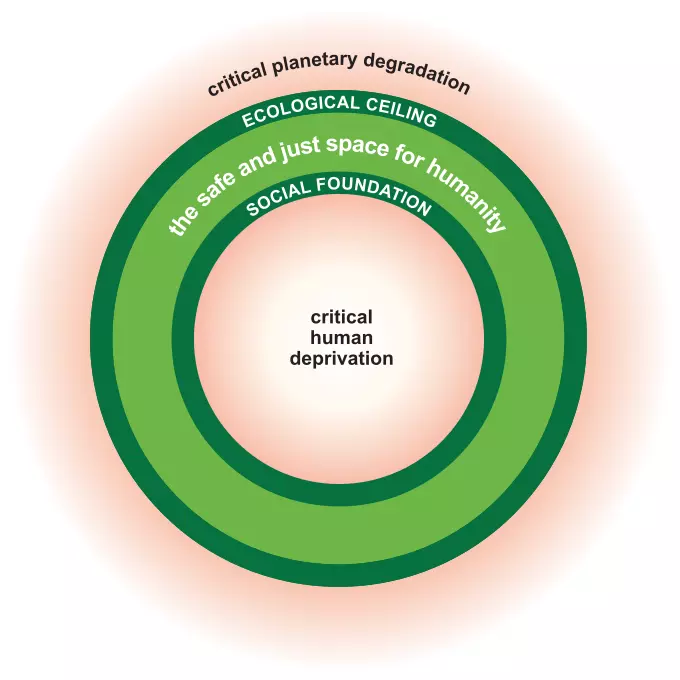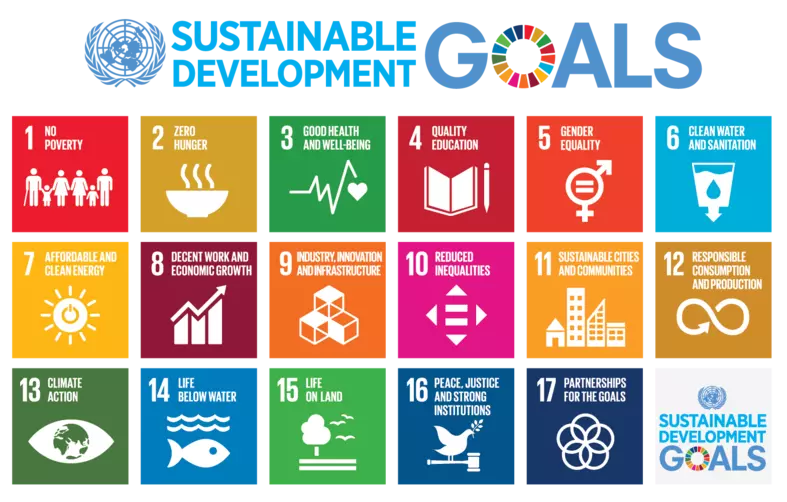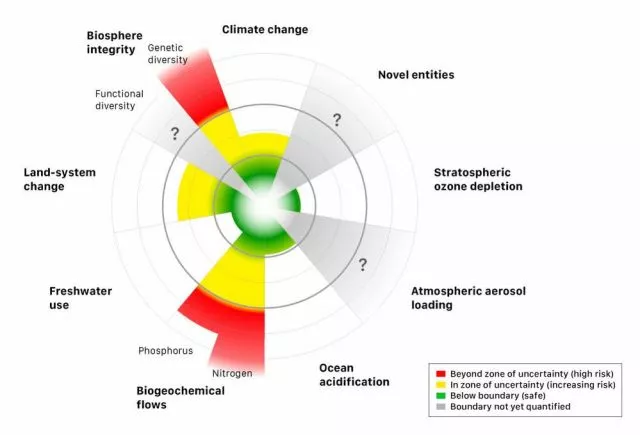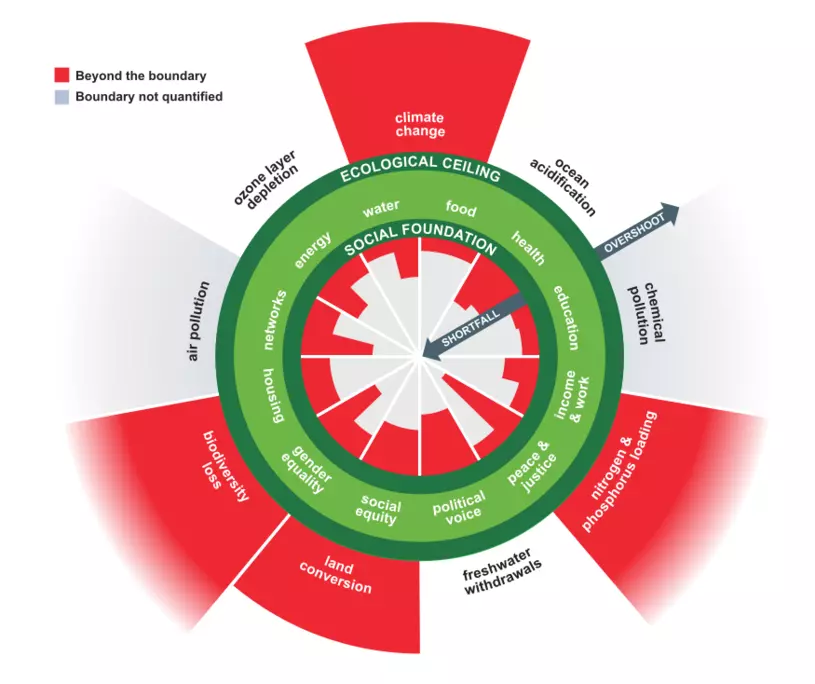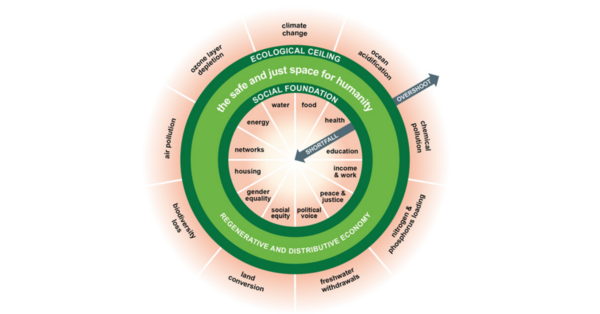
What is the Doughnut?
An introduction to the concept at the heart of Doughnut Economics

Version 1.0 (September 2020)
Overview
This tool is an introduction to the concept at the heart of Doughnut Economics. It's been designed as both a document that can be shared and a presentation that can be given in a classroom, a workshop or a meeting. Either download it as a pdf (below), open it within Google drive (links below) or scroll down to read on this page.
Links
Open as a document in Google Docs
Open as a presentation in Google Slides
What is the Doughnut?
Think of it as a compass for human prosperity in the 21st century, whose goal is to meet the needs of all people within the means of the planet.
It consists of two concentric rings:
- A social foundation – to ensure that no one is left falling short on life’s essentials.
- An ecological ceiling – to ensure that humanity does not collectively overshoot planetary boundaries.
Between these two boundaries lies a doughnut-shaped space that is both ecologically safe and socially just – a space in which humanity can thrive.
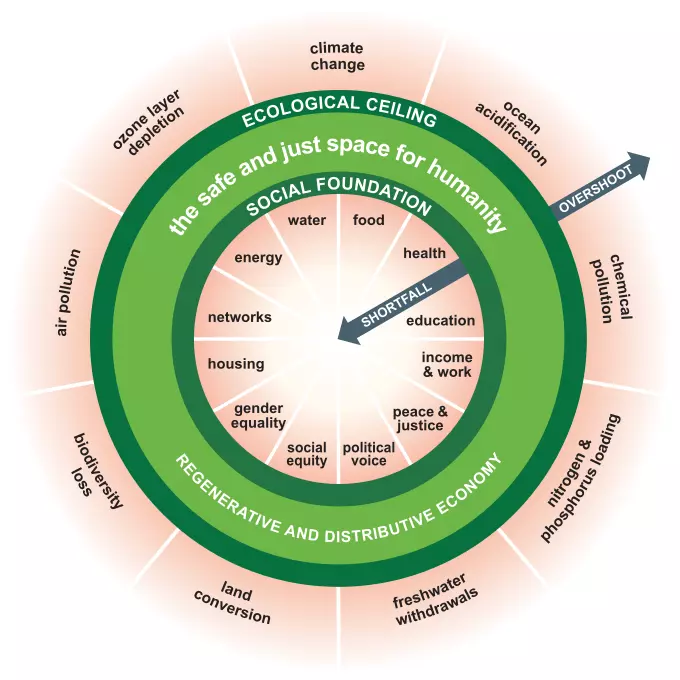
The essence of the Doughnut
1. The social foundation – below which lies critical human deprivation
2. The ecological ceiling – beyond which lies critical planetary degradation
These two boundaries are foundational in the sense that humanity should always seek to avoid critical human deprivation and critical planetary degradation. But how best to define their specific dimensions and measure their current status relative to desired outcomes will keep evolving over time.
The Doughnut’s dimensions
(as of 2017)
The Social Foundation
The 12 dimensions of the social foundation are derived from the social priorities agreed in the Sustainable Development Goals (UN, 2015).
The Ecological Ceiling
The 9 dimensions of the ecological ceiling are the nine planetary boundaries defined by Earth-system scientists (Steffen et al., 2015).
Quantifying the Doughnut
The image below reveals the current state of humanity and our planetary home: think of it as humanity’s ‘selfie’ in the early days of the 21st century.
Each dimension is measured, where possible, with 1 or 2 indicators, and the red wedges show the extent of shortfall and overshoot of the Doughnut’s social and planetary boundaries.
It shows us that millions of people still fall short on all 12 of the social dimensions, and that humanity has already overshot at least four planetary boundaries (air pollution and chemical pollution are currently unquantified).
To achieve the 21st century goal of meeting the needs of all within the means of the living planet means eliminating all of the red from the Doughnut diagram, and this must be done from both sides at the same time.
Find out more
- Explore the dimensions of the social foundation and ecological ceiling
- Explore the selection of these dimensions, including their limitations
- Read chapter one of Doughnut Economics: Seven Ways to Think Like a 21st-Century Economist
Share
Attachments
Share
-
Story

Doughnut economics on brillder
Our latest online learning module on brillder introduces students to doughnut economics
-
Story
.jpg)
Donut Brasil bursts into life!
Connecting diverse communities of practice around the idea and principles of the Donut
-
Story

Between D.E. and Gender Inclusion in Nigeria
Blending Doughnut Economics with Gender Inclusion as a solution for many challenges in Nigeria.
-
Story

Exploring sustainability in digital tech
Can Doughnut Economics be used as a holistic way of exploring the digital tech sector’s impact on global sustainability?
-
Story

Doughnut-PESTLE Hydrogen Model (DPHM)
Analysing the hydrogen economy by applying a Doughnut-PESTLE Hydrogen Model
-
Story

BORO Doughnut: DE in Middlesbrough
Bottom up practical steps taken to form a community action group and alliances to Downscale DE in a town
-
Story
.png)
Yerevan embraces “Doughnut mindset”
Reprioritizing priorities; Yerevan embraces “Doughnut mindset” on its way to sustainable development
-
Story

Renegade Neighbourhood Economists Wanted
Exploring Doughnut Economics in the round as peers.
-
Member


Alexandra Cook
London, England, United Kingdom
I am a secondary school teacher (Geography Ages 11+ - GCSE, Politics A-level) holding a BA International Politics. I'd like to incorporate doughnut economics into my curriculum and ensure students have a clear picture of economic systems and their impact before they leave school. Want to help stimulate a move towards a circular, inclusive economy, and do my part to help our society respond to a clear climate crisis in the 21st Century. Keen to collaborate with other educators.
-
Member


Evert Taihuttu
London
-
Member

Gerard Meaney
Dublin, Leinster, Ireland
-
Member


Kevin Shea
Baiting Hollow, Calverton, New York, United States of America
Founder of Effective Altruism Rationality To Help (e.a.r.t.h.) 501c3; Designer, builder, resident of Long Island Green Dome and Gardens; Steward of O Parks, Wildlife and Recreation in Nicaragua; Just a general all-purpose terra-sapien
-
Member


Karina Olavarria
Lo Barnechea, Región Metropolitana de Santiago, Chile
Soy Karina, me considero una ingeniera de los procesos de reemplazo. Soy una optimista.
-
Member

Gentiana Nasi
City of London, England, United Kingdom
I am Gena; have lived in lots of places and am currently in London. I identify myself as a platonist and my focus is to dedicate my energy to "the true", "the good" and "the beautiful". Understanding the nature of reality and helping perpetuate the above triad with every decision I take can be undeniably challenging. Often intent guides actions, and I used to think that constant and conscious alignment with the intent is bound to derive the desired manifestation. However, our world is complex, and often the right intent isn't sufficient - our actions, although well intended, have unintended consequences and externalities, and the incentives society, business and culture project upon us often derive undesired results. This realisation has recently guided me towards learning more about systems thinking, complexity science, sustainability, circular economy and also to joining this community.
-
Member

.jpg)
Stéphanie Gauthier
Les Houches, Auvergne-Rhône-Alpes, France
Teacher in economics and management, I am committed to resilience in the Mont Blanc valley
-
Member

Jane Whild
Milton Keynes, England, United Kingdom
I am and ex University Administrator, now spending my time on activism in local communities in Milton Keynes to tackle the Climate Crisis, Misogyny and Gender Inequality. I am a core member of the MK Doughnut Economics Group which operates under the umbrella of Transition Town MK. Our group are part of a fledgling Milton Keynes Climate Action Network (MKCAN). I am a member of the Women's Equality Party (WEPUK) - the first political party to adopt Doughnut Economics as policy. I am also a member of FawcettMK, Citizens:mk and Cycling Citizens MK. I would like to see the Doughnut applied to my Borough and am a member of Milton Keynes DECA (Doughnut Economics Climate Action) Group.
